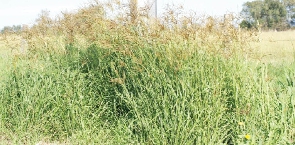Over time, the cattle industry in Nigeria has been neglected, and competition for resources, water access and grazing lands has resulted in violent conflicts between sedentary farmers and herders.
Many farmers are now looking at opportunities within various industries in the livestock sector for income generation and reduction or elimination of bloodshed.
One of the emerging stakeholders, the National Pasture and Livestock Feed Association of Nigeria, said they had received an order from other countries to supply a variety of grass for cattle feed called Chloris Gayana worth $70 million.
Alhaji Muhammad Alibaba, the president of Pasture and Livestock Feed Association of Nigeria, told Daily Trust on Sunday that there are so many opportunities for farmers who want to cultivate varieties of improved grasses, which can be taken by either ranchers in the country or exported to countries with large dairy herds with suitable land for cultivation.
“Right now, we have an interim order for a variety of grass called chloris gayana to the tune of US$70million, so we are trying to develop that at two ranches in Mokwa, Niger State. Although those ranches were abandoned since the 1950s, we are trying to revive it,” he said.
Chloris gayana is a significant tropical grass found across tropical and subtropical regions of the world. It has great quality, drought-resistant and is an effective feed for grazing and hay.
Alhaji Alibaba said the government needed to give an appropriate focus to the sector because it has enormous potentials, adding that countries like the United Arab Emirate (UAE) are waiting for the farmers to produce and export.
He also said there was a good potential, particularly in terms of milk, given the quantum of resources yearly ranchers waste on importation of grasses that ordinarily would have been produced locally.
“So, the next focus of the federal government is to collaborate with state and local governments to rehabilitate those grazing reserves because we all recognised that time had passed for this style of herding for the reason that is not efficient because these animals, whatever they eat as they move, they lose it, so they give very limited milk.
“What the government needs to do is to rehabilitate these grazing reserves and engage in an intensive reorientation of these herders. Nomads naturally resist change, but once they see the benefits they will adopt the change and start coming to the reserves,” he said.
The president of Pasture and Livestock Feed Association said if herders were economically empower to buy feed, things would change.
“Their orientation is that feed is free, so they have not factored that into the economy of production for themselves. They need a lot of reorientation. By the time they do the pros and cons and realise the volume of milk they make – multiples of what they used make – they will easily adjust. It is a common sense and every human being is endowed with that common sense, that seeing is believing.
“So what is needed of the government is to rehabilitate these grazing reserves, reorientation of these herders and put necessary infrastructure – water, veterinary services etc;” he said.
The pasture producer advised the government to look into the feed industry for livestock, particularly the nomads, just the way government support crop farmers with fertiliser, seed and herbicides.
He added that once the government supports with feeds it would help grow the industry and change the mindset of many herders, who would then take up the production or procurement for their herds.
He opined that government had to stimulate that market by encouraging people to produce feed massively, particularly where there are reserves, with herders noting that it would encourage them to stay, particularly when they know they will get feeds, water and other services.
With that initiative, gradually, by the time government starts withdrawing its support, they will appreciate that and start buying.
The farmers are already producing other varieties’ like the brachiaria, gamba and other varieties and supply ranches where milk are produced across the country.
For many farmers, he said there were opportunities, adding, “The market is there. Once you produce, we off-take.”
Rain-fed wheat variety trials did well – Farmers
Wheat farmers have said that the four varieties of wheat: two for rain-fed and two for irrigation purposes, developed by the National Institute for Wheat Research in Lake Chad, Maiduguri in Borno State, have shown very positive results.
Shuaibu Hamza of the National Association of Wheat Farmers, Processors and Marketers of Nigeria said the four varieties could help the country to produce enough wheat for local consumption and export.
“We have made some trials of those four varieties of wheat at Kura in Kano. We have developed four plots of land for these varieties. We have tested the rain-fed and it did very well. We have tested the irrigation varieties and it did very well.
“Right now, as an association we have identified 77,000 hectares of land for the coming dry season. The bulk of this land is new and about 40,000 of it is in Niger State. We have coordinators for this land for anybody to check. We also have 20,000 farmers we can supply data today if the need arises,” he said.
He said if farmers in Plateau, Taraba and Cross River could be supported, the rain-fed wheat has huge potentials in those areas because of their unique weather condition
Malam Hamza said farmers were ready to move the wheat cultivation forward in this country if the necessary support came through.
“All we need from the government is the enabling environment – give farmers the necessary incentives, equipment, herbicides and the security environment to cultivate,” he said.
He said farmers wanted the security in the North West, North East and North Central to be improved so that they could go back to their farmers.
Business News of Sunday, 13 August 2023
Source: www.dailytrust.com













